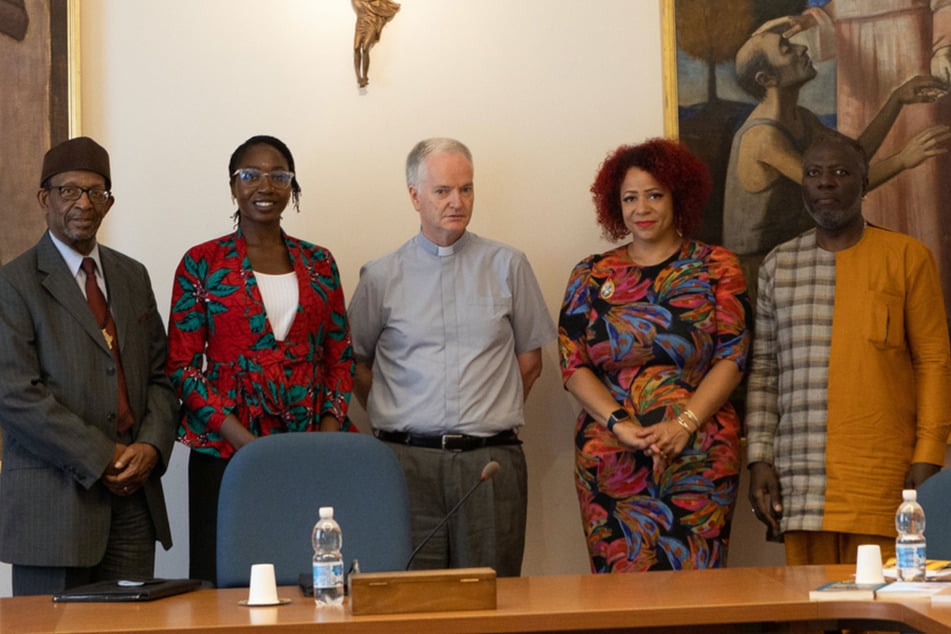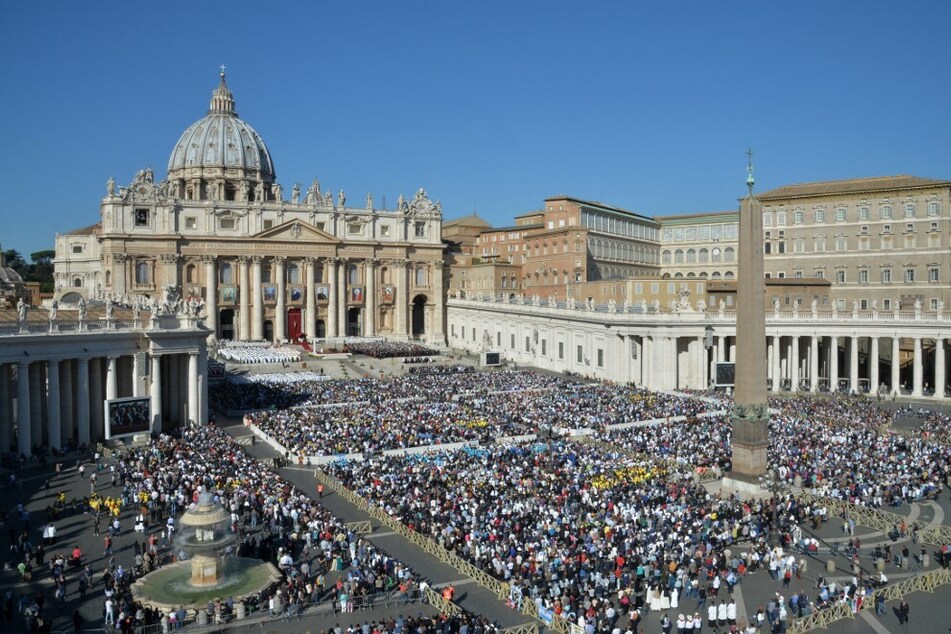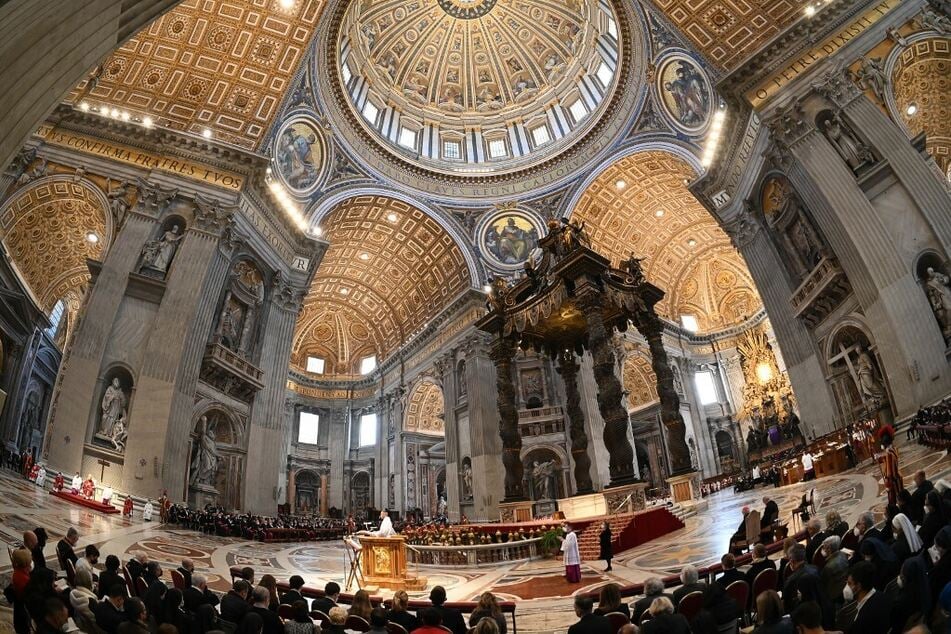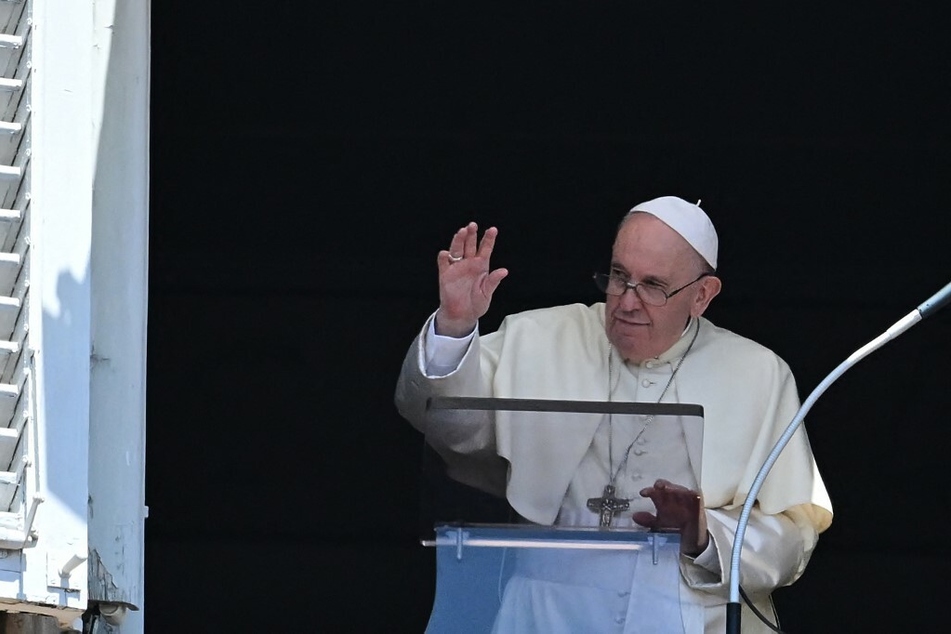Reparations advocates meet with Vatican on Catholic Church's role in Transatlantic Slave Trade
Vatican City - US reparations advocates traveled to Vatican City on Monday to discuss the Catholic Church's role in the Transatlantic Slave Trade and chart a path toward healing.

National African American Reparations Commission (NAARC) Convenor Dr. Ron Daniels, Global Circle for Reparations and Healing strategist Dr. Amara Enyia, 1619 Project author Nikole Hannah-Jones, and Reparations United Director Kamm Howard were among the delegation that made the trip, according to a NAARC press release.
At the Vatican, they met with Bishop Paul Tighe, secretary of the Pontifical Council of Culture, and his assistant and delivered a Presentment detailing the harms inflicted by the Catholic Church since the time of enslavement.
"We, descendants of Africa, the birthplace of humanity and the cradle of human civilization, come before the Holy See in the quest for full accountability, reparations, and healing," the Global Circle for Reparations and Healing wrote in the document.
"We seek redress for sinful actions ordered, blessed, condoned, and promoted by the Roman Catholic Church that paved the way for the oppression and suffering of African people on the continent and across the Diaspora from the 15th century to the present moment."
Outlining the harms done

The advocates then proceeded to outline the specific damages caused by the Catholic Church.
Those harms included trafficking and enslaving people of African descent and creating and endorsing an ideology of white supremacy and Black inferiority, the Presentment explains.
Starting in the 15th century, the Church began issuing papal decrees authorizing European powers to begin wars against African peoples and plunder the continent. Then in 1542, Pope Nicholas V issued a decree granting Portugal the right to "reduce [African] persons into perpetual slavery."
These decrees set the stage for the Catholic Church's full-scale engagement in the system of enslavement. They sanctioned private contracts, known as Asientos de Negros, to European powers and private merchants, ensuring that the Church would get up to 50% of the profits from the trade of enslaved people.
The Catholic Church reaped massive profits from the stolen wealth and labor of the African continent. Meanwhile, an estimated 170 million people died during the Transatlantic Slave Trade.
The Catholic Church sought to legitimize its crimes against humanity by claiming they were done in the name of Jesus Christ.
Lasting impacts of the Church's actions

To this day, the Catholic Church's legacy of white supremacy may be felt on both sides of the Atlantic, advocates pointed out.
The "transgenerational poverty" of Black people around the world vis-à-vis the "transgenerational wealth and privilege" of white people stems from the era of enslavement. In the centuries since, no actions have been taken to provide comprehensive redress for these crimes.
That's why one in three African people today live below the global poverty line. They constitute around 70% of the world's poorest people, authors said, citing statistics from the World Poverty Clock. Things look similar in the United States, where almost one-fifth of people of African descent live below the poverty line, according to recent Census data.
"These statistics do not begin to describe the pain of centuries of lost hopes, lost dreams and lost lives. They do not begin to describe the deep emotional anguish of living in a world that so profoundly devalues Black lives," the Presentment authors state.
"The Holy Roman Catholic Church owes a profound moral and financial debt for its sins and offenses against Africa and its people, in the form of full reparations, including economic, social, political, and emotional reparations."
Charting a way forward

Despite the magnitude of the damage done, reparations advocates who made the journey to the Vatican said they were hopeful they can work together with the Church for positive change.
They called on the Catholic Church to embrace Pope Francis' message of Fratelli Tutti, a 2020 encyclical asserting the common humanity of all people, in seeking healing for people of African descent.
During the meeting, reparations advocates proposed several concrete steps the Vatican should take, starting with an official apology acknowledging the full scale of their complicity in enslavement.
The coalition of activists also demanded the Church rescind its decrees authorizing enslavement, issue an encyclical on reparations for people of African descent, establish a papal reparations commission, and join calls for former colonial powers to establish their own redress programs.
They also emphasized the need for the Church to provide financial restitution for its role in enslavement, stating that while the monetary impact will be "impossible" to calculate, the Vatican must at least commit to attempting the task.
After the trip to the Vatican, NAARC described the meeting with Bishop Tighe as "welcoming and productive," with the expectation of continued collaboration on the reparations plan.
Cover photo: National African American Reparations Commission

